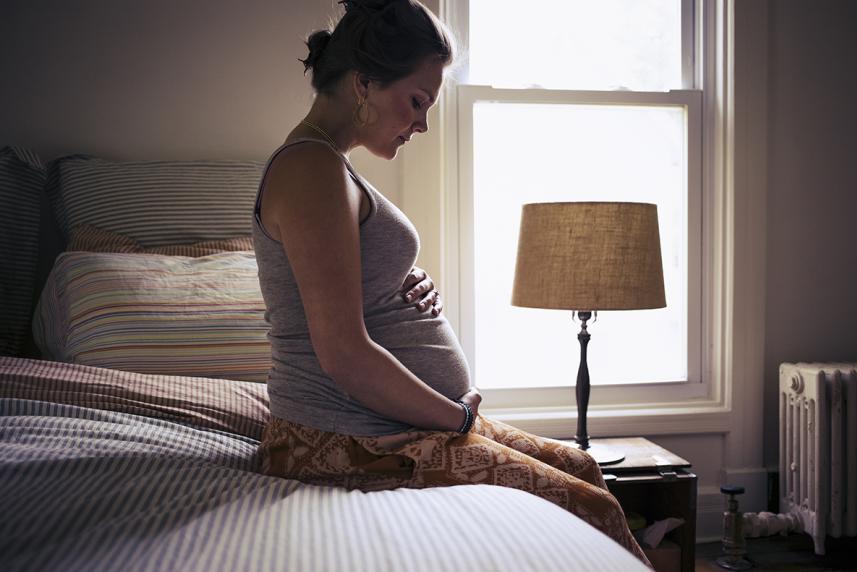5 Ways Pregnancy Messes With Your Sleep
Hormones, heartburn, midnight trips to the bathroom. A number of things can disrupt your sleep when you’re pregnant. Get around them with this expert advice.

If you’re pregnant and feel like you’re more tired than usual, it’s not all in your head. Pregnancy ramps up your need for sleep. Your body is in overdrive, working hard to nurture and grow your baby. And at the same time, it can be tough to get the sleep you need. That’s due to a number of factors, from hormonal shifts to your changing shape.
But it’s important to get as much sleep as you can during these months. Research shows that pregnant people who get less than 6 hours per night, particularly later in pregnancy, may be more likely to have longer, more difficult labors.
“Adequate sleep helps with energy levels and reduces stress, both of which are good for a healthy pregnancy,” says Lindsay Appel, M.D. Dr. Appel is a board-certified ob-gyn at the Family Childbirth and Children’s Center at Mercy Medical Center in Baltimore.
Here are some common sleep disruptors you may face during pregnancy, plus some solutions for getting the z’s you need.
Hormonal Shifts
Early in pregnancy, you have a surge in the hormone progesterone. This makes you sleepy. That’s why you may feel the urge to take naps during your first trimester. That said, progesterone also interferes with sleep quality. So while you may find yourself nodding off earlier, you also may wake up a lot more.
Sleep-better solutions: You can’t change the hormones that are affecting your sleep. But you can improve your sleep habits to help yourself sleep better at night and feel more rested during the day. Try to go to bed and wake up at the same time every day. Keep your bedroom dark, cool, and relaxing. Getting some exercise during the day may also help you sleep better at night. Ask your doctor what kind of exercise and how much is right for you.
Gastroesophageal Reflux (or Heartburn)
Even early in pregnancy, many people have a relaxing of the muscles near the entrance to the stomach. Their job is to keep food and digestive acids in the stomach from backing up into the esophagus. Reflux happens when the muscles relax and stomach acid flows the wrong way in your esophagus. This gets worse when you lie down at night. It can disrupt your sleep.
Sleep-better solutions: To get some relief, try not to eat in the three hours leading up to bedtime. You can also prop your body up on a wedgelike pillow. Talk to your doctor about which antacids may be safe to take for heartburn during pregnancy.
Urinary Frequency
When you’re pregnant, you have to pee more often, including at night. Here’s why.
During your first trimester, your kidneys are busy making extra fluids. Those fluids often end up in your bladder. As your pregnancy progresses, your uterus expands and presses on your bladder. That makes you have to go even more often.
Sleep-better solutions: Try not to drink fluids too close to bedtime. And limit how much caffeine you drink. Caffeine is a diuretic. That means it makes you have to pee more often. Also, be sure you’re emptying your bladder as best as you can. Lean forward on the toilet when you pee. Finally, to prepare for all those trips to the bathroom, get a night-light. That way you won’t have to turn on the lights when you get up at night. Bright light would further disrupt your sleep.
Insomnia
Did you suffer from insomnia before you got pregnant? (Insomnia is the inability to fall asleep or stay asleep on an ongoing basis.) If so, it may continue or get worse now. Or it may become an issue for you even if you’ve never had trouble sleeping before.
Many factors contribute to the problem. Physical changes may make you uncomfortable at night. Ramped up stress about childbirth and new parenthood may also keep you tossing and turning.
Sleep-better solutions: Try to do something relaxing before bed, such as taking a warm bath or shower. Sleep on your side, if you can. That opens your windpipe and can help prevent sleep apnea, which can wake you up at night. This position also improves blood flow to the uterus. That helps deliver nutrients and oxygen to the fetus.
Still having a hard time falling asleep after 20 to 30 minutes? Get out of bed and do something relaxing, such as reading a book. Then try going to sleep again.
Restless Legs Syndrome
Pregnant people may be 2 to 3 times more likely than the general population to have a sensorimotor condition called restless legs syndrome (RLS). It causes an uncomfortable urge — like a twitchy feeling — to move your legs. The causes are not completely understood. Some researchers suggest it could be linked to low levels of folate or iron.
Sleep-better solutions: If your RLS is constant and severe, talk to your doctor. They may test your blood for iron or folate levels. If they’re low, you may be prescribed a supplement. Some pregnant people also get relief from moderate exercise, yoga, or prenatal massage. A doctor might also prescribe pain medications in certain situations.
More Ways to Get the Best Night’s Sleep Possible
The best advice for getting a good night’s sleep during pregnancy is similar to what you should do when you’re not pregnant, says Dr. Appel: “Use your bed for sleep, not for watching TV or using a computer.” Try different sleep and pillow positions that offer the most comfort. Finally, as best you can, work naps into your day. They’re a great way to make up for lost nighttime sleep.
[Sources:]
[1.] Naghi I, Keypour F, Ahari SB, et al. “Sleep Disturbance in Late Pregnancy and Type and Duration of Labour.” Journal of Obstetrics and Gynaecology, vol. 31, no.6, August 2011, pp: 489-491.
[2.] Won CH. “Sleeping for Two: The Great Paradox of Sleep in Pregnancy.” Journal of Clinical Sleep Medicine, vol. 11, no. 6, June 2015, pp: 593-594.
[3.] Srivanitchapoom P, Pandey S, and Hallett M. “Restless Legs Syndrome and Pregnancy: A review.” Parkinsonism and Related Disorders, vol. 20, no. 7, July 2014, pp: 716–722.
[4.] Gupta R, Dhyani M, Kendzerska T, et al. “Restless Legs Syndrome and Pregnancy: Prevalence, Possible Pathophysiological Mechanisms and Treatment.” Acta Neurologica Scandanavia, vol. 133, no. 5, May 2016, pp: 320-329.
[5.] Mayo Clinic Minute: Timing Snacks to Avoid Heartburn.” Mayo Clinic, November 23, 2017, https://newsnetwork.mayoclinic.org/discussion/mayo-clinic-minute-timing-snacks-to-avoid-heartburn/. Accessed January 25, 2022.



